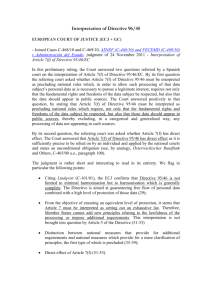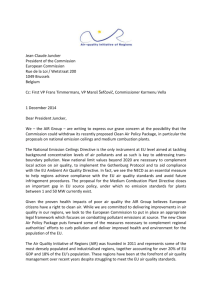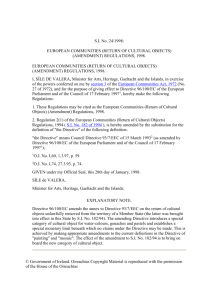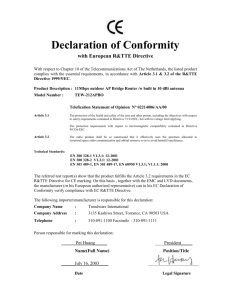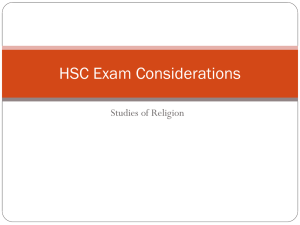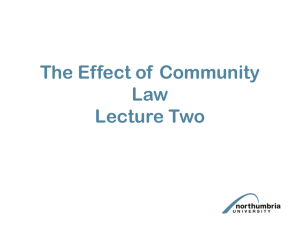Annex on Legal aspects
advertisement
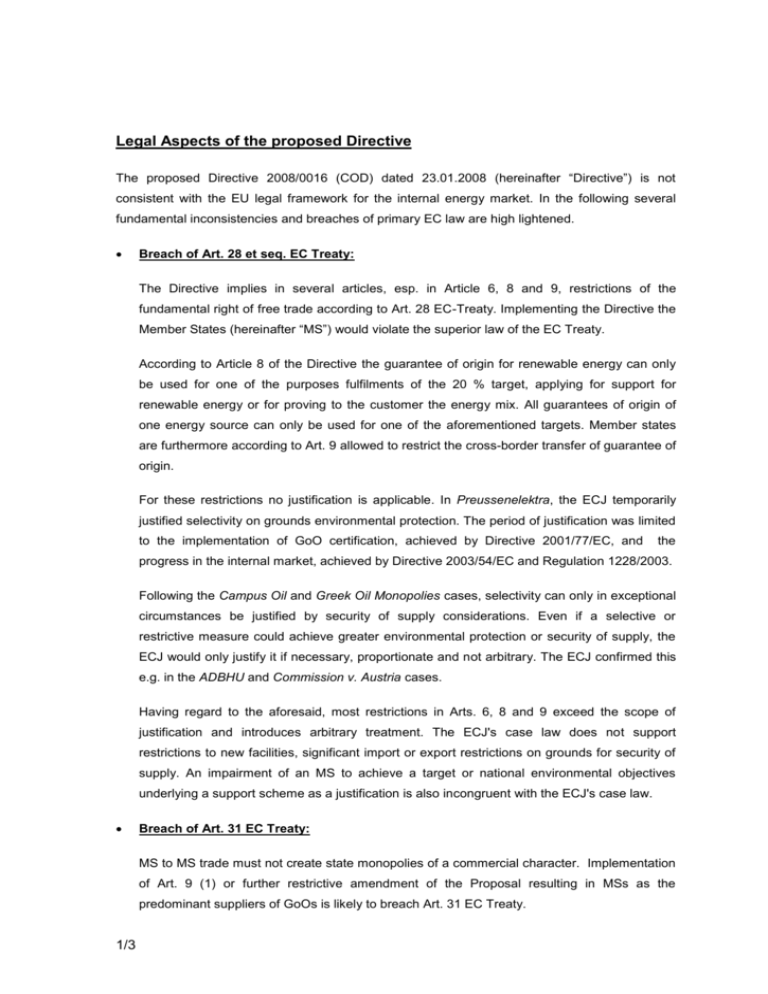
Legal Aspects of the proposed Directive The proposed Directive 2008/0016 (COD) dated 23.01.2008 (hereinafter “Directive”) is not consistent with the EU legal framework for the internal energy market. In the following several fundamental inconsistencies and breaches of primary EC law are high lightened. Breach of Art. 28 et seq. EC Treaty: The Directive implies in several articles, esp. in Article 6, 8 and 9, restrictions of the fundamental right of free trade according to Art. 28 EC-Treaty. Implementing the Directive the Member States (hereinafter “MS”) would violate the superior law of the EC Treaty. According to Article 8 of the Directive the guarantee of origin for renewable energy can only be used for one of the purposes fulfilments of the 20 % target, applying for support for renewable energy or for proving to the customer the energy mix. All guarantees of origin of one energy source can only be used for one of the aforementioned targets. Member states are furthermore according to Art. 9 allowed to restrict the cross-border transfer of guarantee of origin. For these restrictions no justification is applicable. In Preussenelektra, the ECJ temporarily justified selectivity on grounds environmental protection. The period of justification was limited to the implementation of GoO certification, achieved by Directive 2001/77/EC, and the progress in the internal market, achieved by Directive 2003/54/EC and Regulation 1228/2003. Following the Campus Oil and Greek Oil Monopolies cases, selectivity can only in exceptional circumstances be justified by security of supply considerations. Even if a selective or restrictive measure could achieve greater environmental protection or security of supply, the ECJ would only justify it if necessary, proportionate and not arbitrary. The ECJ confirmed this e.g. in the ADBHU and Commission v. Austria cases. Having regard to the aforesaid, most restrictions in Arts. 6, 8 and 9 exceed the scope of justification and introduces arbitrary treatment. The ECJ's case law does not support restrictions to new facilities, significant import or export restrictions on grounds for security of supply. An impairment of an MS to achieve a target or national environmental objectives underlying a support scheme as a justification is also incongruent with the ECJ's case law. Breach of Art. 31 EC Treaty: MS to MS trade must not create state monopolies of a commercial character. Implementation of Art. 9 (1) or further restrictive amendment of the Proposal resulting in MSs as the predominant suppliers of GoOs is likely to breach Art. 31 EC Treaty. 1/3 Despite the restriction to trajectory achievement, this is likely to create perverse incentives for some MSs to restrict cross-border trade by economic operators to the greatest possible extent. Such restrictions increase the number of GoOs the MS can transfer and profit from. If there is any concern about windfall profits, it is clearly the MSs who would receive such profits under this arrangement. Contrasted with use of proceeds requirements from the auctioning of EUAs under the EU ETS Phase III proposal, this is unreasonable and underlines that grounds for justifications are likely to be fabricated rather than factually justified. Breach of Art. 49 et seq. EC Treaty: The current wording of Art. 8 conflicts with Art. 9 (2). Art. 8 is conducive to a restrictive interpretation of support scheme eligibility. This is likely to lead to great inefficiencies in crossborder trade. Suppliers and traders, rather than generators, have the capability to achieve economically efficient cross-border trades. What's more, these restrictions fundamentally conflict with their freedom to provide services, such as cross-border trade and transmission services provided as principal or agent for a generator. Breach of Art. 10, 81, 82 and freedom of contract: The long-term lock-in effect of Art. 8 (2) breaches fundamental principles of EU unfair competition and contract law. Art. 8 (2) will entrench long-term exclusive supply contracts. For conventional generation this is prohibited anti-competitive practice under Art. 81, 82 EC Treaty. Art. 10 EC Treaty prohibits MS to foster such practices. Art. 86 (2) EC Treaty may only justify such practices as a public service obligations for environmental protection or security of supply if they are necessary and proportionate. A generator wishing to supply to different entities throughout the lifetime of the project does clearly not consider it necessary to have a long-term exclusive supply contract. For feed-in schemes this is further restricted by the narrow interpretation of TSO and DNO public service obligation under Directive 2003/54/EC. Furthermore, an obligation to enter into such a contract is a very severe restriction of the freedom of contract and private autonomy. The severity of this restriction is out of proportion to the obscure benefits from forced long-term exclusive contracting. Neither increased environmental protection nor security of supply would logically be caused by it or benefit from it. Frustration of legitimate expectation: The wording of Directive 2001/77/EC and suggestions by the Commission to use the GoO for fuel mix disclosure irrespective of national support schemes has created a well functioning disclosure market. It has also created a legitimate expectation of continuity of this use among consumers and suppliers. There are contractual relationships between consumers and suppliers on this basis whose expiry will fall well after the implementation of the Directive. 2/3 The protection of legitimate expectation is a general principle of Community law. The mutually exclusive use of GoOs under Art. 8 (1) (a), (b) and Art. 8 (1) (c) breaches this principle. Conflict with Directive 2003/54/EC and Regulation 1228/2003: Where GoOs are imported with electricity, the already obscure priority dispatch provisions under Art. 11 (3) of Directive 2003/54/EC and Art. 12 of the Directive conflict with the capacity allocation and congestion management obligations and principles under Directive 1228/2003. A priority of the Directive over Regulation 1228/2003 in this regard is clearly not the intention but the lack of clear cross-referencing makes this ambiguous and creates significant uncertainty affecting both the conventional and the renewable energy market. [Signature] 3/3
